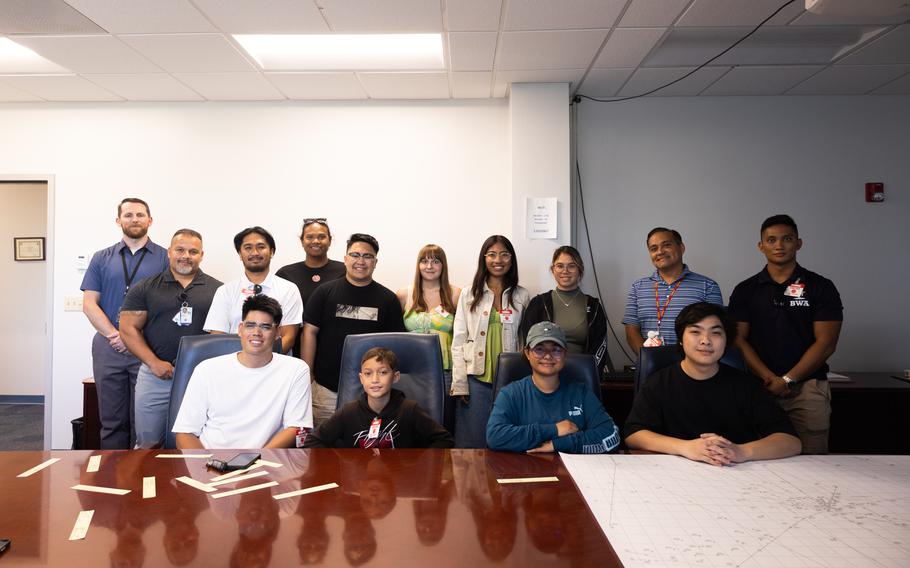Education
Six become FAA-certified remote pilots through UOG Drone Corps
University of Guam September 30, 2024

The fourth cohort of the UOG Drone Corps during a field trip to the Air Traffic Control Tower in Tiyan, Guam. (Photos courtesy of University of Guam)
Six more University of Guam students have become Federal Aviation Administration–certified remote pilots through the UOG Drone Corps program. The new pilots are the fourth cohort to become licensed through the UOG Drone Corps program as it continues its mission to meet the island’s growing demand for skilled drone operators.
Coming from a range of academic interests, the newly certified remote pilots are biology graduate student Zoe Ariellius, civil engineering major Cyril Concepcion, computer science major Christopher Nadeau, environmental science graduate student Ajalyn Omelau, biology major Diego Ray Quiogue, and agriculture major Farron Taijeron.
Shaping a new generation of remote pilots
To prepare for FAA certification, the students completed a comprehensive course covering drone operation procedures, federal and local airspace restrictions, and meteorological report interpretation. The course was led by experts from Bella Wings Aviation and 2cofly, local drone service providers who have taught previous cohorts.
This latest group of UOG Drone Corps students benefited from the guidance of past program members who have since transitioned into professional roles within the local drone industry, including Javier Garrido, now director of product design at Bella Wings Aviation, and Thomas Torres II, who works with 2cofly. The former members returned to impart industry insights and practical drone operation expertise to the new batch of pilots.
“As the industry expands, there will be far more career opportunities for aspiring pilots outside of video shoots and surveys,” said Garrido, reflecting on the evolving drone industry. “I believe that as the drone systems become more automated and easily flown, we will find more ways to implement them in every work sector.”
Tailored training for real-world applications
By earning their FAA remote pilot certificates, these new drone pilots are now federally authorized to operate drones commercially. This certification unlocks a wide range of professional opportunities from aerial photography to conducting research projects.
They engaged in both coursework and immersive hands-on training, learning basic operation maneuvers with small educational drones before progressively working their way up to larger, more advanced systems.
During their practicum, the cohort participated in significant drone projects, such as mapping the UOG campus, producing an orthomosaic of a reforestation site, and contributing to coral reef monitoring efforts. The program aims to immerse students in real-world scenarios that demonstrate the unique applications of drone technology, particularly in resource management and conservation in Guam.
Participants like Ajalyn Omelau, a UOG graduate student who works as a program manager with the Guam Department of Agriculture’s Forestry and Soil Resources Division, are already applying their newfound piloting skills in their respective fields.
“As the Cooperative Fire Protection program manager, I would like to implement drones in wildland fire investigations, conservation management plans, and creating Guam-specific content for social media and outreach,” Omelau said. “I believe that drone operations will fortify field observations provided by senior personnel and will help inform other natural resource managers.”
Building a sustainable future for Guam’s drone industry
Throughout the semester, the newly licensed remote pilots will receive further specialized training in advanced drone applications, such as coding for drones and utilizing them as environmental surveying tools. According to the program’s education coordinator, Danielle Hagen, this year’s curriculum has been advancing more effectively due to the strategic decision to reduce the cohort size, from 12 pilots in previous years.
“This change has allowed us to advance more rapidly, with the students already completing a significant portion of their required flight hours, and has improved the quality of instructional time,” Hagen said. “We are so excited to see where each of our students will take the skills they learn in our program into their own careers.”
As the demand for drone technology continues to grow locally and globally, these newly certified UOG Drone Corps pilots will be well-equipped to contribute to a range of industries, from environmental conservation to infrastructure development.
For more information about the UOG Drone Corps program, please contact dronecorps@triton.uog.edu.
About UOG Drone Corps
Hosted by NASA Guam Space Grant and NASA Guam EPSCoR at the University of Guam, the UOG Drone Corps program has become a cornerstone of Guam’s drone industry. The program aims to build technical capacity for drone services on the island by creating a cadre of Federal Aviation Administration–licensed, informed, and responsible remote pilots who can support research work in the region by training University of Guam and Guam Community College students. Since its launch in 2021, the program has produced 42 FAA-licensed drone pilots.
About NASA Guam Space Grant
The NASA Guam Space Grant (NGSG) at the University of Guam is a member of the University of Hawai’i Space Grant Consortium, participating in the National Space Grant College and Fellowship program and administering the University Research Internship (URI) program. NGSG aims to inspire and train future generations of professionals in understanding, utilizing, exploring, and investigating both space and Earth through research and internships. Led by faculty of the Micronesian Area Geospatial Information Center (MAGIC) lab at UOG’s Western Pacific Tropical Research Center, the program supports educational initiatives focusing on STEM topics as they support NASA’s missions.
About NASA Guam EPSCoR
The Established Program to Stimulate Competitive Research (EPSCoR) builds partnerships with government, higher education and industry that are designed to effect lasting improvements in a state or region’s research infrastructure, research and development capacity, and its national research and development competitiveness. NASA Guam EPSCoR supports the NASA Earth and Ocean Science Mission by developing capacity at the University of Guam to utilize advanced technologies in remote sensing and geospatial data to address critical challenges in water security, coral reef conservation, terrestrial land change, and biodiversity in the Pacific Islands.